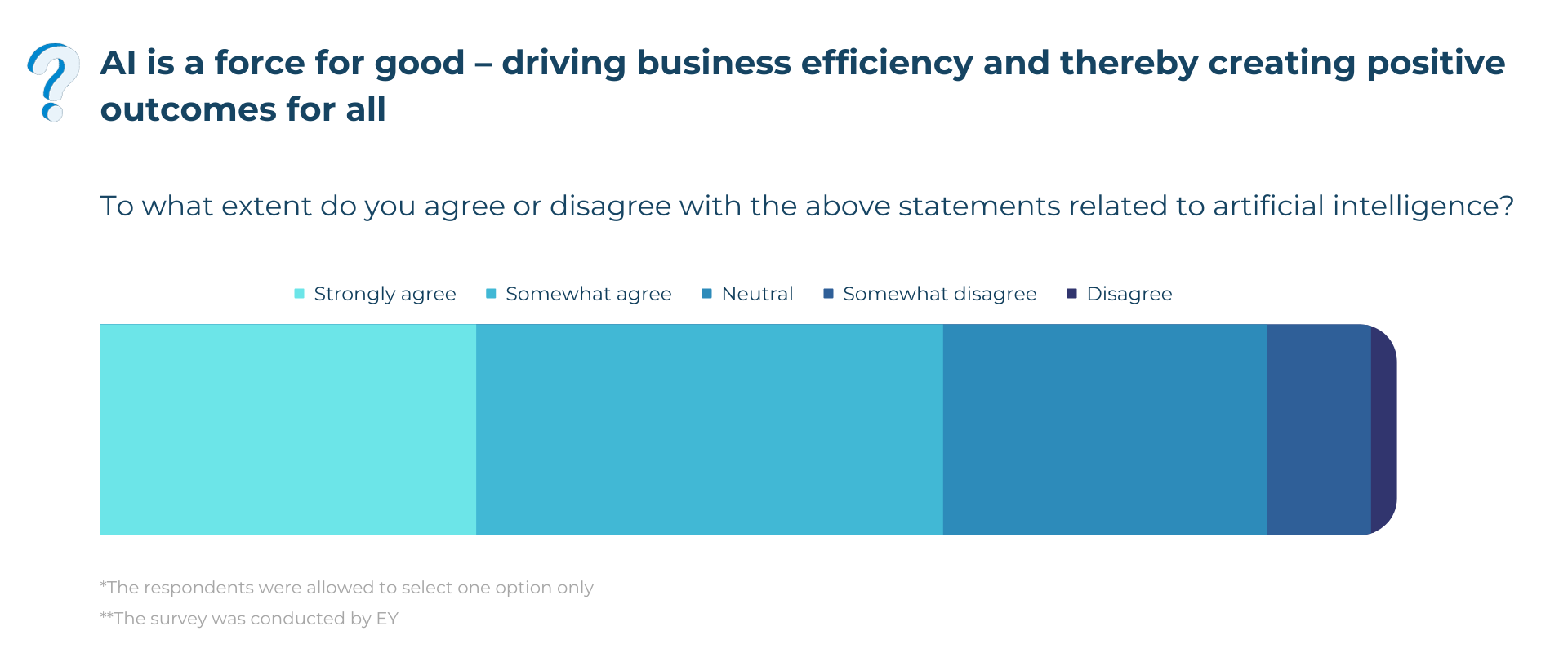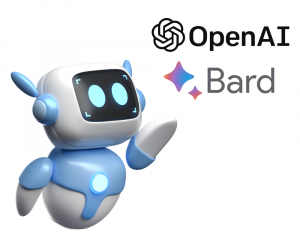2023 was marked by a series of significant events in the IT industry. This includes the debut of ChatGPT, a sharp surge of innovation in the AI technologies segment, and the introduction of novel approaches to applying artificial intelligence.
The digital community warmly welcomed this progress, albeit not without a dose of skepticism regarding the security and effectiveness of these cutting-edge solutions. However, this has not adversely impacted market development, with a CAGR of 32.9%. According to forecasts by NextMSC, the AI industry’s value is projected to reach $1.8 trillion by 2030.
These figures underscore the potential of AI technology and its rapid integration into IT solutions for end-users and business systems.
AdvantISS experts have compiled a report presenting their research findings in digital solutions, specifically AI. Below, you will learn about the challenges and opportunities for businesses in adopting AI.
Tectonic Shifts in Business Approaches
AI and technology have brought numerous innovations to the business world. These innovations have been embraced differently by company executives. According to a survey by EY, CEOs generally have a positive view of AI and its role.
Approximately 29% expressed full confidence in the positive impact of AI implementation on their businesses, particularly in the realms of analytics and marketing. Another 36% partially supported this view, acknowledging the potential benefits of AI for their companies.
In essence, about 65% of CEOs understand the advantages of AI and plan to integrate the technology into their digital infrastructure (as well as invest in AI technology stock). This dispels the myth of conservatism at the top levels of corporate management. More precisely, it signals a significant shift in the views of CEOs, moving from skepticism to nearly full confidence in the benefits of AI in technology.
Based on the survey we mentioned earlier, the majority of CEOs interviewed agreed that AI technologies drive business efficiency, resulting in positive outcomes and innovations.

Flexibility – A Relevant Approach to Business Management
Despite the positive outlook of 65% of CEOs towards AI, they still express concerns about social, ethical, and criminal risks. Moreover, they are already preparing to adapt roles within their companies to accommodate future changes. This is a key characteristic of the adaptability of modern businesses.
As per the survey carried out by EY, another interesting statistic emerges. According to the responses from the participants, around 88% of CEOs have either already invested in AI or plan to do so within the next 12 months.
Only 12% replied that they do not intend to integrate AI technology into their digital products and systems. This demonstrates that most executive directors are prepared for innovation and are revising their business strategies with an eye on trends and future developments.
The Potential of AI in Business Processes and Management
When explaining what AI technologies are in business automation, it is often important to address the current state of affairs. For example, looking at innovation through the lens of skepticism and risk before considering the possibilities.
According to Deloitte, over 67% of CEOs anticipate recessions in 2023-2024. Despite this, nearly 87% still have plans to expand their companies during this period, in part due to the influence of AI.
Nevertheless, they don’t discount the importance of caution, a sentiment often emphasized by prominent investors.

Risk Management as a Key Restraining Factor
In accordance with EY data, around 28% of CEOs are investing equally in sustainable development and innovations, such as new technology in AI. Additionally, 22% and 24% prioritize stability and the adoption of new solutions.
About 74% of experts highlight the importance of an adaptive business model and balance between the speed of deploying cutting-edge solutions and maintaining a stable background to minimize potential risks.
Generative AI Seen as a Field for Experimentation
According to Deloitte, more than 55% of survey respondents claim they actively experiment with new generative AI technology, and 37% even partially or fully integrate it into their digital infrastructure. Such investments promote the development of this sector and create new opportunities for companies.

Among those deploying or planning to deploy AI new technology, there is an unwavering belief in its advantages. About 79% believe that this technology will enhance the efficiency of their brands (accelerating processes and reducing costs), while 52% think it will increase the scaling potential of their companies (through analytical and marketing capabilities).
These beliefs are grounded in reality, as new AI technologies have already demonstrated their value. For instance, companies like Google and Microsoft invest in the industry and actively deploy their solutions with components like Bard or ChatGPT.
RPA, IoT, and Predictive AI are Already Integrated into Companies
As of 2023, companies are adopting the following trends, based on Deloitte:
- Cloud computing is used by more than 81% of respondents.
- RPA is implemented by 42% of companies surveyed.
- IoT is utilized by approximately 38% of businesses.
- Predictive AI is used by 32%, partially used by 25%, and experimented with by 39% of respondents.
- Generative AI is a popular field for experimentation among 55% of brands and as a permanent or partial tool in 37% of companies.
These are general definitions of AI usage in business, but they demonstrate that AI technology has already found numerous applications and shows no signs of slowing down.
AI Advantages for Business from the Perspective of CEOs and More
Every AI user employs technology as they see fit. Some buy AI lenses for entertainment, while others create content, edit images or videos, write music and texts, and program. However, this pales in comparison to the potential of AI for business.
On a global scale, integrating AI into digital systems or developing AI applications to enhance a company’s capabilities significantly impacts the economic component. It also affects analytical capabilities, customer interactions, and process automation.
The results of such innovations almost always include conversion AI and increased company revenues. Therefore, let’s explore each potential advantage of integrating AI into business. We’ll partially rely on The Wall Street Journal and Fortune/Deloitte research.
Improved Efficiency
Approximately 79% of CEOs anticipate that the integration of AI technology will lead to increased profitability for their companies through the enhancement of processes, optimization of routine operations, some reduction in workforce, and cost savings.
This technology can automate and accelerate almost 100% of everyday business tasks and processes, including document processing, risk assessment, impact analysis, and analytics.
Automation, rapid data collection and analysis, real-time response to changes (both local and global), and risk prevention are just some of the opportunities AI offers to improve work efficiency.
Automation of Manual Processes
Over 75% of respondents believe that automation is one of the key advantages of AI enterprise solutions. In 2023, the majority of business processes and operations are performed manually. For example, this includes filling out forms and data collection.
AI allows for the complete automation of most routine processes, if not 100%, then at least most of them. In numerical terms, this translates to accelerating order processing by 30-70%, depending on the sector and business specifics.
Cost Reduction
Around 65% of respondents expect AI to reduce operational costs for companies. The technology can optimize internal business processes.
For instance, it can shorten the order processing chain by removing manual transaction verification and automating inventory and resource control.
Accelerated Data Collection and Analysis
Approximately 61% of respondents believe AI will allow their companies to obtain more new and unique information. Data collection is a vital component of any business and a lever affecting its scalability and profitability.
With AI, sales processes become faster and several times more efficient. The company collects more critical business data, analyzes it better, and automatically generates concepts and strategies. The potential to enhance brand scaling is more than sufficient.
As a result of integrating AI into a company’s digital system, numerous new possibilities will emerge, primarily linked to the automation and optimization of data collection and analysis processes. This will increase business profitability.
Enhanced Scalability
CEO opinions on this point vary somewhat. The majority (51%) believe that AI expands opportunities for company growth, while 37% do not see any prospects or a connection between technology and scaling. Another 11% believe AI cannot influence business expansion at all.
The first category has a sufficient understanding of AI, as the technology genuinely creates a range of opportunities for brand scaling. This includes the ability to predict audience behavior, anticipate market trends, assess the influence of global events on businesses, and understand specific economic sectors.
Risk Management Improvement
When considering risks, the outlook is less optimistic compared to other prospects. CEO attitudes have been cautious in this regard. For instance, only 31% of experts believe that AI enhances risk management processes, while 69% are skeptical.
As of 2023, relying on AI as an autonomous risk management system is not advisable. However, utilizing technology’s capabilities in this process is worthwhile. For example, gaining new information more quickly and making decisions regarding business development.
The Role of AdvantISS in AI Development
If you were inspired by this material or want to implement AI solutions for your company, now is the perfect time. The AdvantISS team has been working in the IT segment since 2016 and was among the first to incorporate AI into its processes.
We know precisely how beneficial this technology is for businesses, so we are proactively implementing AI-driven solutions for our clients. Additionally, we offer services in research and development and consulting in this field, where we develop prototypes for various systems.
Do you want to learn more about the advantages of AI for your company or even begin the integration of this technology right away? Contact an AdvantISS manager and receive a free consultation!

